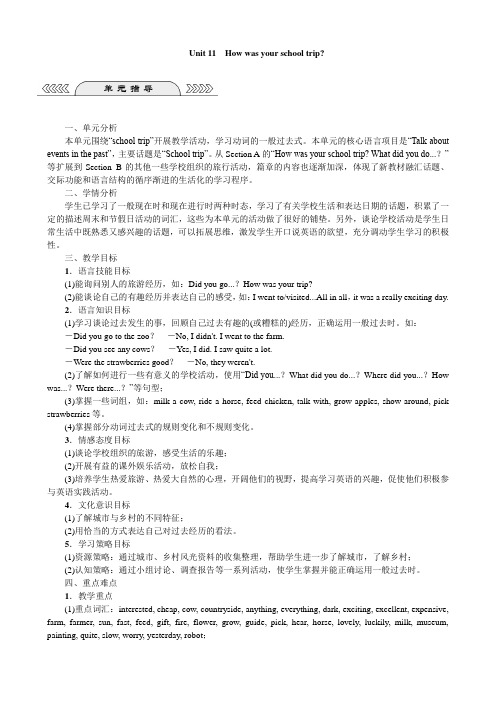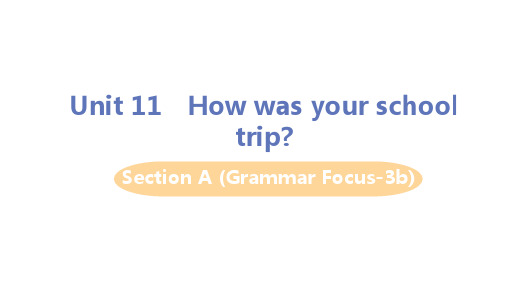七年级下册(人教版2011)Unit11&Unit12 翻译句子
- 格式:doc
- 大小:27.00 KB
- 文档页数:3

Unit 11How was your school trip?一、单元分析本单元围绕“school trip”开展教学活动,学习动词的一般过去式。
本单元的核心语言项目是“Talk about events in the past”,主要话题是“School trip”。
从Section A的“How was your school trip? What did you do...?”等扩展到Section B的其他一些学校组织的旅行活动,篇章的内容也逐渐加深,体现了新教材融汇话题、交际功能和语言结构的循序渐进的生活化的学习程序。
二、学情分析学生已学习了一般现在时和现在进行时两种时态,学习了有关学校生活和表达日期的话题,积累了一定的描述周末和节假日活动的词汇,这些为本单元的活动做了很好的铺垫。
另外,谈论学校活动是学生日常生活中既熟悉又感兴趣的话题,可以拓展思维,激发学生开口说英语的欲望,充分调动学生学习的积极性。
三、教学目标1.语言技能目标(1)能询问别人的旅游经历,如:Did you go...?How was your trip?(2)能谈论自己的有趣经历并表达自己的感受,如:I went to/visited...All in all,it was a really exciting day.2.语言知识目标(1)学习谈论过去发生的事,回顾自己过去有趣的(或糟糕的)经历,正确运用一般过去时。
如:-Did you go to the zoo?-No, I didn't. I went to the farm.-Did you see any cows?-Yes, I did. I saw quite a lot.-Were the strawberries good?-No, they weren't.(2)了解如何进行一些有意义的学校活动,使用“Did you...?What did you do...?Where did you...?How was...?Were there...?”等句型;(3)掌握一些词组,如:milk a cow, ride a horse, feed chicken, talk with, grow apples, show around, pick strawberries等。


人教版七年级下册Unit 11 How was your school trip? 短语归纳1.go for a walk 散步k a cow 挤牛奶3.ride a horse骑马4.feed chickens喂鸡5.talk with a farmer和农民交谈6.take photos 照相7.quite a lot 许多8.learn ...from...向...学..9.ask sb sth询问某人某事10.grow up 长大11.grow apples 种苹果12.show sb sth出示某人某物13.show sth to sb向某人出示某物14.show sb around 带某人四处逛15.from...to...从...到...16.pick strawberries 摘草莓17.take ...to..把...带到...18.visit sb看望某人19.visit sth参观某物20.in the countryside 在乡下21.go fishing 钓鱼22.watch sb do sth 观看某人做某事23.watch sb doing sth观看某人正做某事24.go to the zoo 去动物园25. a lot of 许多26.climb the mountains爬山27.under the tree 树下e out 出来,出版29.fire station 消防站30.all day long 一整天31.art museum艺术馆32.go on a school trip 学校旅行33.science museum科技馆34.get there 到那35.along the way 沿路36.play chess with 和...下棋37.teach sb sth 教某人某事38.make a model robot制作机器人模型39.the gift shop 礼品店40.all in all 总而言之41.take the train to 成火车去...42.slow train 慢车43.be interested in 对...感兴趣44.be difficult to do sth做某事难45.too many 太多46.not ...at all一点也不47.go to the countryside 去乡下。



人教版七年级英语下册Unit11课文+单词+朗读+知识梳理+词汇讲解+句型解析milk [mɪlk] v. 挤奶cow [kaʊ] n. 奶牛,母牛;母兽milk a cow给奶牛挤奶horse [hɔː(r)s] n. 马ride a horse骑马feed [fiːd] v.(fed/fed)喂养;饲养feed chickens喂鸡farmer ['fɑː(r)mə(r)] n.农民;农场主quite [kwaɪt] adv.相当;完全quitea lot(of…)许多anything ['enɪθɪŋ](常用于否定句或疑问句)任何东西;任何事物grow [grəʊ] v.种植;生长;发育farm [fɑː(r)m] n.农场 v.务农pick [pɪk] v.采;摘excellent ['eksələnt] adj.countryside ['kʌntrɪsaɪd].乡村;农村inthe countryside在乡下;在农村yesterday ['jestə(r)dei] adv.昨天flower ['flaʊə(r)] n.花worry ['wʌri] v.&n.担心;担忧luckily ['lʌkɪli] adv.幸运的;好运的sun [sʌn] n.太阳museum [mjuː'ziəm] n.博物馆fire ['faɪə(r)] n.火;火灾frie station ['steɪʃ(ə)n]消防站painting ['peɪntɪŋ] n.油画;绘画exciting [ɪk'saɪtɪŋ] adj.使人兴奋的;令人激动的lovely ['lʌvli] adj.可爱的expensive [ɪk'spensɪv] adj.昂贵的cheap [tʃiːp] adj.廉价的;便宜的slow [sləʊ] adj.缓慢的;迟缓的fast [fɑːst] adv.&adj. 快地(的)robot ['rəʊbɒt] n.机器人guide [gaɪd] n.导游;向导gift [gɪft] n.礼物;赠品all in all总的来说everything ['evrɪθɪŋ] pron.所有事物;一切interested ['ɪntrəɪstɪd] adj.感兴趣的be interested in… 对……感兴趣dark [dɑː(r)k] adj.黑暗的;昏暗的hear [hɪə] v.(heard/hɝ:(r)d)听到;听见Carol ['kærəl]卡罗尔(女名)【重点短语】1. school trip 学校旅行2. go for a walk 去散步3. milk a cow 挤牛奶4. ride a horse 骑马5. feed chickens 喂鸡6. talk with a farmer 与农民交谈7. take some photos 照相8. ask some questions 问一些问题9. grow apples 种苹果10. show sb. around sp. 带某人逛某地11. learn a lot 学到许多12. pick some strawberries 摘草莓13. last week 上周14.In the countryside 在乡村15. visit my grandparents 拜访我的祖父母16. go fishing 去钓鱼17. sound good 听起来很好18. climb the mountains 去爬山19. play some games 玩一些游戏20. visit a museum 参观博物馆21. visit a fire station 参观消防站22.draw pictures 画画23. go on a school trip 去旅行24 visit the science museum 参观科技博物馆25. how to make a model robot 如何制作机器人模型26. gift shop 礼品店27. buy sth. for sb. =buy sb. sth.为某人买某物28. all in all 总得来说29. be interested in... 对…感兴趣30. be expensive 昂贵的31. not...at all 一点儿也不【重点句型】1.---Did you see any cows? 你见到奶牛了吗---Yes, I did. I saw quite a lot. 我见到了而且见到了很多很多2. ---Did Carol take any photos? 罗尔拍照片了吗?---Yes, she did.是的,她拍了。
Unit 11 How was your school trip?1.短语归纳2.典句必背3.用法集萃(1)I saw quite a lot. 我看到了很多。
❖quite a lot表示“许多”,若表示“许多....(人或物)”要用quite a lot of... 的搭配。
例:I ate quite a lot last night. And I didn't feel well. 昨天晚上我吃了许多。
我觉得不舒服。
We saw quite a lot of sheep in the village. 我们在那个村庄里看到了许多绵羊。
(2)But I milked a cow. 但是我给一头奶牛挤奶。
❖milk 作名词,意为“牛奶”,是不可数名词。
例:I’d like a cup of milk. 我想要杯牛奶。
❖milk 作动词,意为“挤奶”。
例:I helped the farmer (to) milk the cow. 我帮助农民挤奶。
(3)Carol picked some strawberries and took them home.卡萝尔摘了一些草莓并且把它们带回了家。
❖pick用作动词,有“采;摘”之意。
此时是及物动词,宾语通常是花或果实等。
例:She went to the garden and picked some strawberries. 她去花园摘了一-些草莓。
❖拓展pick up是固定搭配,意为“捡起;拾起”,它的宾语有两种形式:(4)And I fed the chickens with my grandpa. 我还和我爷爷起喂鸡了。
❖feed作动词,意为“喂养;饲养”,它的过去式是fed。
例:Yesterday I went to the farm and fed chickens there. 昨天我去了农场并且在那里喂鸡了。
(5)But at about two o’clock, it got very cloudy and we worried it would rain.但是在大约两点时,天气变得多云了,我们担心会下雨。
人教版英语七年级下册Unit11 How was your school trip?同步讲义和练习题一.【重点短语】1. buy sth. for sb.= buy sb. sth.为某人买某物2. all in all 总的来说3. be interested in 对…感兴趣4. feed chickens 喂小鸡(chicken,鸡肉不可数,小鸡可数)5. learn about 了解6. not…at all 一点也不7. not at all.不用谢8. quite a lot 相当多9. show around 带领参观10. grow strawberries 种植草莓11. pick strawberries 采草莓12. in the countryside 在乡下13. go fishing 去钓鱼14. at night 在夜晚15. a lot of= lots of 许多,大量16.go for a walk=have a walk=take a walk 去散步e out 出来18.ride a horse 骑马19. along the way 沿线20. after that 之后21. milk a cow 挤牛奶二.【重点句型】1. I saw quite a lot. 我看到了很多。
a lot表示“许多”,是一个副词短语,放在句末;若表示“许多....(人或物)”要用a lot of... 的搭配。
例:I ate quite a lot last night. And I didn't feel well. 昨天晚上我吃了许多。
我觉得不舒服。
We saw quite a lot of sheep in the village. 我们在那个村庄里看到了许多绵羊。
2. But I milked a cow. 但是我给一头奶牛挤奶。
milk 作名词,意为“牛奶”,是不可数名词。
人教版七年级下册Unit 11 How was your school trip?1、last week 上周2、go on a school trip 去参加学校旅行3、climb the mountains 去爬山4、visit a museum 参观博物馆5、show sb. around 带某人参观6、be interested in 对……感兴趣7、not… at all 根本不……8、buy sb sth = buy sth. for sb. 为某人买某物9、go for a walk 去散步10、in the countryside 在乡下11、take photos / a photo 拍照12、learn a lot 学到很多13、all in all 总的来说14、from… to…从……到……15、talk with 与……谈话talk about sth. 谈论某事16、go fishing 去钓鱼17、a lot/lots of 许多;大量18、come out 出来19、be interested in 对……感兴趣20、milk a cow 挤牛奶21、ride a horse 骑马22、quite a lot 相当多23、visit sb 看望某人24、have a nice weekend 周末愉快1、quite a lot: 相当多,可+of+可数名词复数或不可数名词,也可单独使用;quite a little: 相当多,后跟不可数名词;quite a few: 相当多,后跟可数名词复数;2、exciting 令人兴奋的(修饰物);excited 感到兴奋的(修饰人);I am excited about an exciting movie.我对一部令人兴奋的电影感到兴奋。
类似用法的还有:interesting有兴趣的,interested感到有趣的;boring无聊的,bored感到无聊的;relaxing放松的,relaxed感到放松的;surprising惊奇的,surprised感到惊奇的;3、somewhere 在某处、到某处(常用于肯定句中);I will go somewhere warm.我要去暖和的地方。
11单元
1.我想知道你的上一次学校旅行如何。十分糟糕。
I want to know school trip .
It .
2.你昨天没去动物园吗?是的。昨天下雨。
you go to the zoo ?
.It rain yesterday.
3.你10小时前看到了一些牛奶吗?是的,我看到了相当多。
Did you see milk 10 hours ?
Yes,I a lot.
4.这些鸡肉刚刚是好的吗?不是,但它昨天是好的。
these chicken good now?
No,but good yesterday.
5.天阴得很,我们担心将要下雨。
It very cloudy and we it would rain.
6.房间真的很暗,拍照很困难。(用一般过去式)
The rooms really dark and it difficult take
photos
7.总之,这是令人兴奋的一天。(用一般过去式)
,it was day.
8.李麟蜂在2009年时擅长游泳。
Li Linfeng good at 2009.
He well in 1999.
9.你昨天学到了一些东西吗?
Did you ?
10.我上周去看望了乡下的爷爷奶奶。
I my grandparents last week.
12单元
1.他太累,在公交车上睡着了。
He was tired he fell asleep(入睡)on the bus.
2.这里有许多的绵羊和老鼠。
There a lot of and .
3.昨天谁在学校跳舞了?游择息跳舞了。
Who yesterday?
You Zexi .
4.我发现李骥毫经常玩游戏。
I Li Jihao often .
5.他太高了以至于必须蹲着走过去。(蹲:squat)
He is high must go in the past.
6.我想要你告诉我你的年龄。
I want me your age.
7.那就是为什么跳伞很危险。
That is to jump.
8.我昨天熬夜看美国职业篮球赛。
I late watch NBA
9.多么有趣的一天啊!
What interesting day !
10.我昨天出了车祸。
太糟糕了!
I had a car accident yesterday.
.